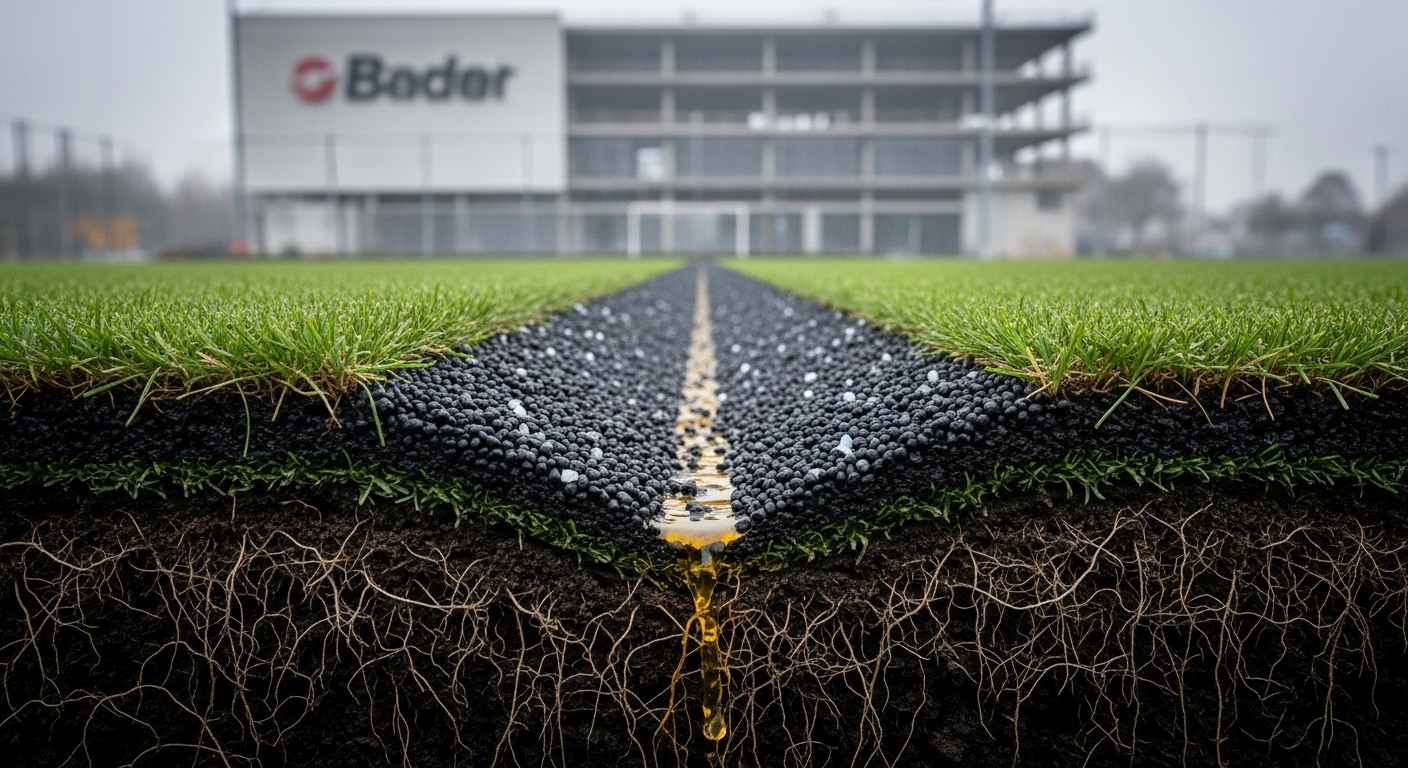
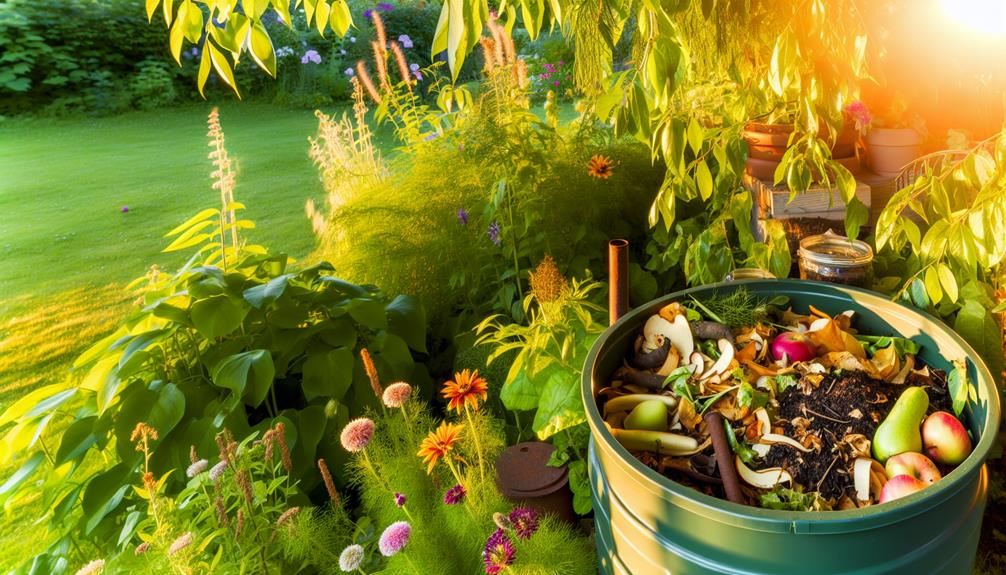
Compost rust represents a fascinating microbial phenomenon transforming organic waste management landscapes. This intricate biological process involves complex interactions between decomposing materials and unique fungal ecosystems.
Advanced composting techniques now leverage specialized rust-based microbial strategies, enabling more efficient nutrient cycling and sustainable waste reduction.
The innovative approach promises remarkable potential for agricultural and environmental sustainability, signaling a groundbreaking shift in organic waste processing methodologies.
In Rust, the Composter is a crucial crafting tool that allows players to transform organic waste into valuable fertilizer. This game mechanic provides a sustainable way to recycle organic materials, enhancing crop growth and resource management strategies for players focused on farming.
The Rust composter offers players a unique opportunity to convert various organic materials into fertilizer. By understanding which items can be composted, players can efficiently manage their resources and optimize their farming strategies.
The system encourages players to collect and recycle different organic waste, turning potential garbage into a valuable agricultural resource that supports crop growth and sustainability.
The Rust composter represents a sophisticated crafting mechanism that mimics real-world composting principles. Players must strategically collect and combine organic materials to create fertilizer, which requires careful resource management and understanding of the game’s crafting system.
The composter acts as a critical tool for players seeking to establish sustainable farming practices within the harsh survival environment of Rust.
While the composting system attempts to simulate organic decomposition, players should note that the fertilizer yield can be quite low, especially for items like berries. The game developers continue to refine this mechanic to make it more engaging and practical for players’ farming strategies.
Also Read: Can You Compost Celery?
Incorporating rust into your compost enriches it with iron, a vital nutrient that enhances garden soil health and supports plant growth. Additionally, rust improves soil aeration, enabling roots to access oxygen more effectively.
Adding rust to your compost significantly boosts its iron content, which is essential for robust plant growth. Rust forms through the oxidation of iron when exposed to oxygen and moisture, creating iron oxide. This compound acts as a slow-release source of iron for plants, ensuring sustained nutrient availability.
Iron is a critical component in chlorophyll production, the pigment responsible for photosynthesis. Insufficient iron can lead to chlorosis, a condition where leaves turn yellow while veins remain green. By incorporating rust into your compost, you help prevent iron deficiencies and promote lush, vibrant foliage in your garden.
Rust enhances compost’s ability to improve soil aeration, benefiting plant roots and overall soil structure. When iron oxide integrates into compost, it encourages the activity of aerobic bacteria, which thrive in oxygen-rich conditions. These bacteria are essential for breaking down organic matter effectively, producing nutrient-dense compost.
By incorporating rust into your compost, you provide a valuable source of iron, enhance soil aeration, and promote the growth of healthy, vibrant plants. Start utilizing rust today to elevate your composting efforts and improve your garden’s overall health.
Iron Mineral Transformations – Iron minerals in soil undergo complex transformations that play crucial roles in ecosystem processes. These tiny iron particles, typically 10,000 times smaller than a sand grain, have large surface areas that can bind nutrients, environmental contaminants, and carbon.
Nutrient Interaction – Iron oxides act as important sorbents for nutrients like phosphate and silicate in soil environments. In specific contexts like rice paddy soils, these minerals significantly influence nutrient availability and ecosystem dynamics.
Contaminant Management – Iron minerals serve as efficient traps for toxic metal contaminants such as zinc, cadmium, lead, and uranium. They help manage the mobility and availability of these potentially harmful elements in contaminated soil environments.
Potential Limitations – Caution is advised when introducing rust to soil. Research indicates that iron rust solutions can potentially:
Contrary to popular gardening myths, simply adding rusty nails or iron rust is not recommended as an effective soil improvement technique. Specialized fertilizers and professional soil management strategies are more reliable for maintaining soil health.
Also Read: Can You Compost Basil?
When composting rust can offer benefits, it’s important to recognize some potential drawbacks. One major concern is compost contamination. Rust itself is primarily iron oxide, which isn’t harmful in small quantities. However, if the rusty items come from painted or treated metals, they might introduce potential pollutants into your compost. These pollutants can include harmful chemicals or heavy metals that could jeopardize the health of your compost and, subsequently, your garden.
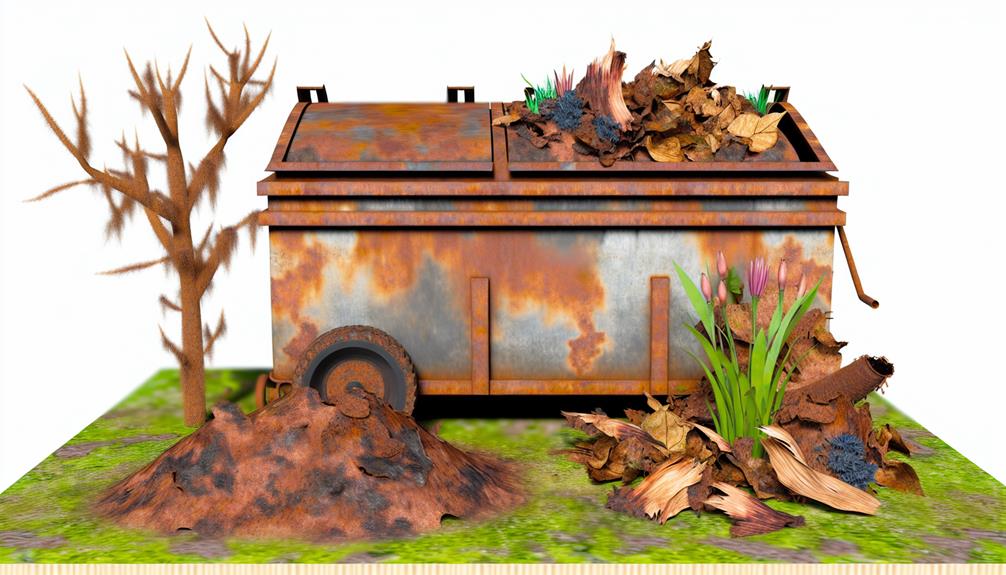
Another issue is the breakdown rate. Rusty items mightn’t decompose as quickly as organic matter, leading to uneven compost texture. This can be particularly problematic if you aim for a fine, crumbly compost. You might find yourself sifting through remnants of rusted metal that haven’t fully broken down.
Moreover, there’s also the question of balance. Adding too much rust could alter the pH level of your compost. While a little iron can be beneficial, an excess might make your compost too acidic, potentially harming plants that prefer neutral or slightly alkaline soil.
Lastly, handling rusty items requires caution. Sharp edges can cause injuries, so always use gloves and take care when adding rust to your compost pile.
When composting, you’ll often come across various rusty items like garden tools, nails, screws, and metal containers. It’s important to know how each of these items can affect your compost. Let’s explore their decomposition process and the best practices for including them in your compost pile.
Garden tools like shovels, hoes, and trowels often develop rust and can be composted if they’re no longer usable. Rust forms due to metal oxidation, a natural process that occurs when tools are exposed to moisture and air. While maintaining your garden tools is crucial to prevent rust, sometimes the damage is too extensive, and the tools can’t be salvaged.
When considering composting rusty garden tools, follow these steps to make sure the process is smooth:
Aside from garden tools, rusty nails and screws can also be added to your compost heap. When you’re cleaning out your garage or workshop, don’t hesitate to toss those old, rusty items into your compost pile. The rust on nails, screws, and other metallic objects like rusty toys and rusty hinges can actually benefit the composting process by adding a small amount of iron to the mix.
Before you add these items, make sure they’re free from non-compostable materials such as plastic or rubber. While it’s safe to include rusty nails and screws, be cautious about the quantity. Too many metal items can make your compost pile difficult to manage and may pose safety hazards when turning the heap.
To avoid injury and ensure even distribution, it’s a good idea to mix them well into the pile. Spread them across different layers rather than clustering them in one spot. This helps facilitate better decomposition and prevents any potential damage to your composting equipment.
Many types of rusty metal containers, like old cans and buckets, can be valuable additions to your compost heap. These items, despite their metal corrosion, have the potential to break down over time and contribute to your compost’s health.
However, understanding the decomposition process and how different metal containers vary in terms of longevity is crucial.
When adding rusty metal containers to your compost, consider the following:
Also Read: Can You Compost Barbecue Sauce?
Rust composting is an innovative approach to soil enrichment that transforms iron oxide into a valuable nutrient source. By strategically incorporating rusty metal fragments into organic waste, gardeners can enhance soil structure, improve mineral content, and support plant growth through a sustainable recycling process.
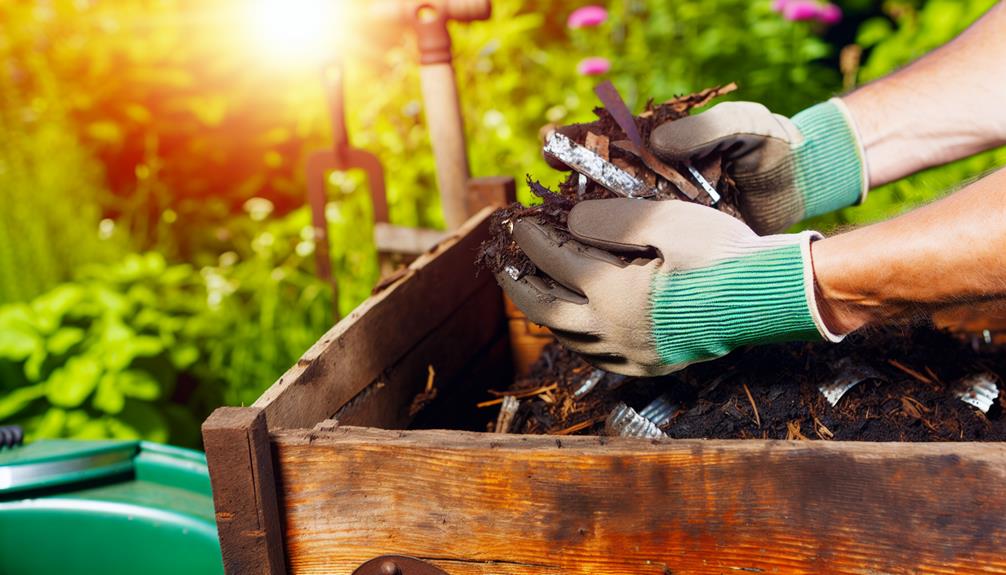
Composting rust can be an effective way to enrich your soil and improve compost quality. Here’s how to do it correctly:
Rust Composting Basics: Rust, or iron oxide, provides a slow-release source of iron that benefits soil health. It helps improve soil aeration and supports chlorophyll production in plants.
Preparation Steps
Composting Process
Key Composting Considerations
Rust Breakdown Process – Rust decomposes through:
Important Cautions
Also Read: Can You Compost Artichoke?
For successful composting, make sure you maintain a balanced mix of green and brown materials. This balance is fundamental to composting basics. Greens include items like vegetable scraps, coffee grounds, and grass clippings, which provide nitrogen. Browns, such as dried leaves, cardboard, and straw, offer carbon. A good rule of thumb is to keep a ratio of roughly three parts brown to one part green.
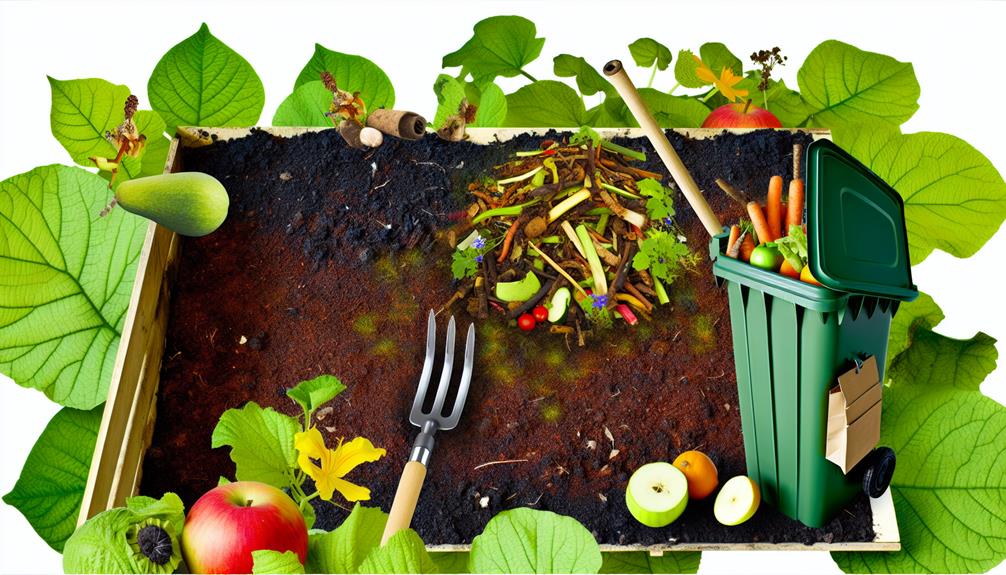
Turn your compost regularly to aerate the pile. This encourages aerobic bacteria to thrive, speeding up the decomposition process. Keep the compost pile moist, but not too wet. Think of it like a damp sponge. If it’s too dry, decomposition slows; too wet, and it could start to smell.
Chop or shred larger items before adding them to the pile. Smaller pieces break down faster, ensuring a more uniform compost. Be mindful of what you add—avoid meat, dairy, and diseased plants, which can introduce pests or pathogens.
Lastly, patience is key. Composting is a natural process that takes time. By following these composting basics, you’ll achieve successful composting, creating rich, fertile compost that benefits your garden and the environment.
You shouldn’t compost painted or coated metal items. These can leave chemical residues in your compost, affecting its quality and environmental impact. Stick to safe, natural materials to keep your compost clean and eco-friendly.
Yes, rust formation can cause pH fluctuation in your compost pile. You’ll want to monitor the balance; too much rust might make the pile more acidic. Keeping a healthy compost community is key for everyone involved.
In the game Rust, the composter is a deployable device that transforms food, plant fiber, and horse dung into fertilizer by decomposing items over time. Each dung input produces approximately five fertilizer units.
No, composting rust won’t attract pests or insects. Pest habits and insect behavior typically focus on organic matter, not metal. You’re safe to compost rust without worrying about unwanted critters joining your compost pile.
Do not compost broad beans infected with rust. Remove and destroy infected plant material to prevent spreading fungal spores and potential reinfection in future crops.
It appears that the intricate relationship between compost and rust reveals fascinating insights into organic decomposition and material degradation. The synergy between rust composter technologies and natural decomposition processes demonstrates remarkable potential for sustainable waste management.
By understanding the complex interactions of organic materials and metal oxidation, researchers can develop innovative strategies for more efficient composting methods.
These findings underscore the importance of continued exploration in rust composting techniques, ultimately contributing to more environmentally conscious waste reduction and recycling approaches.
